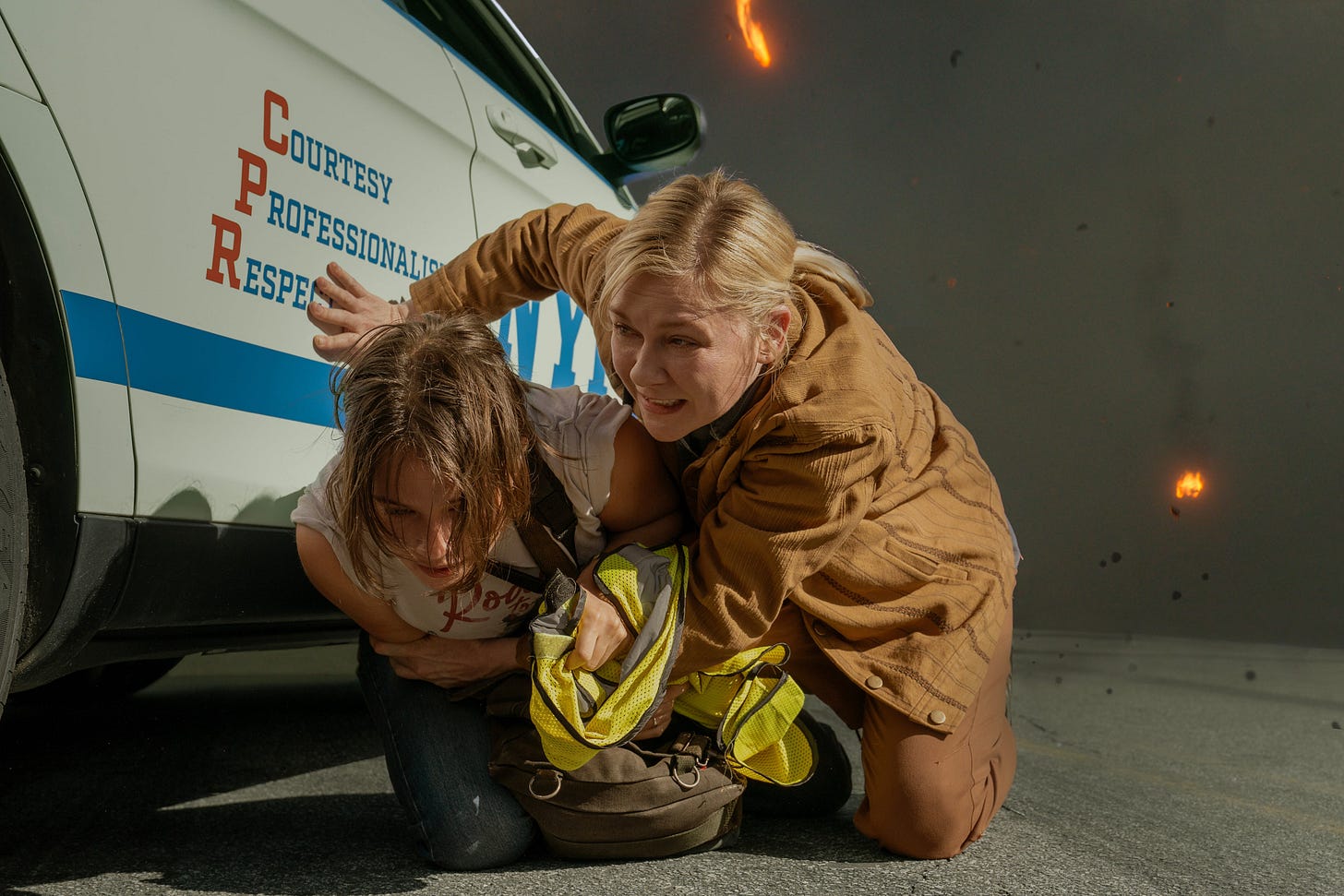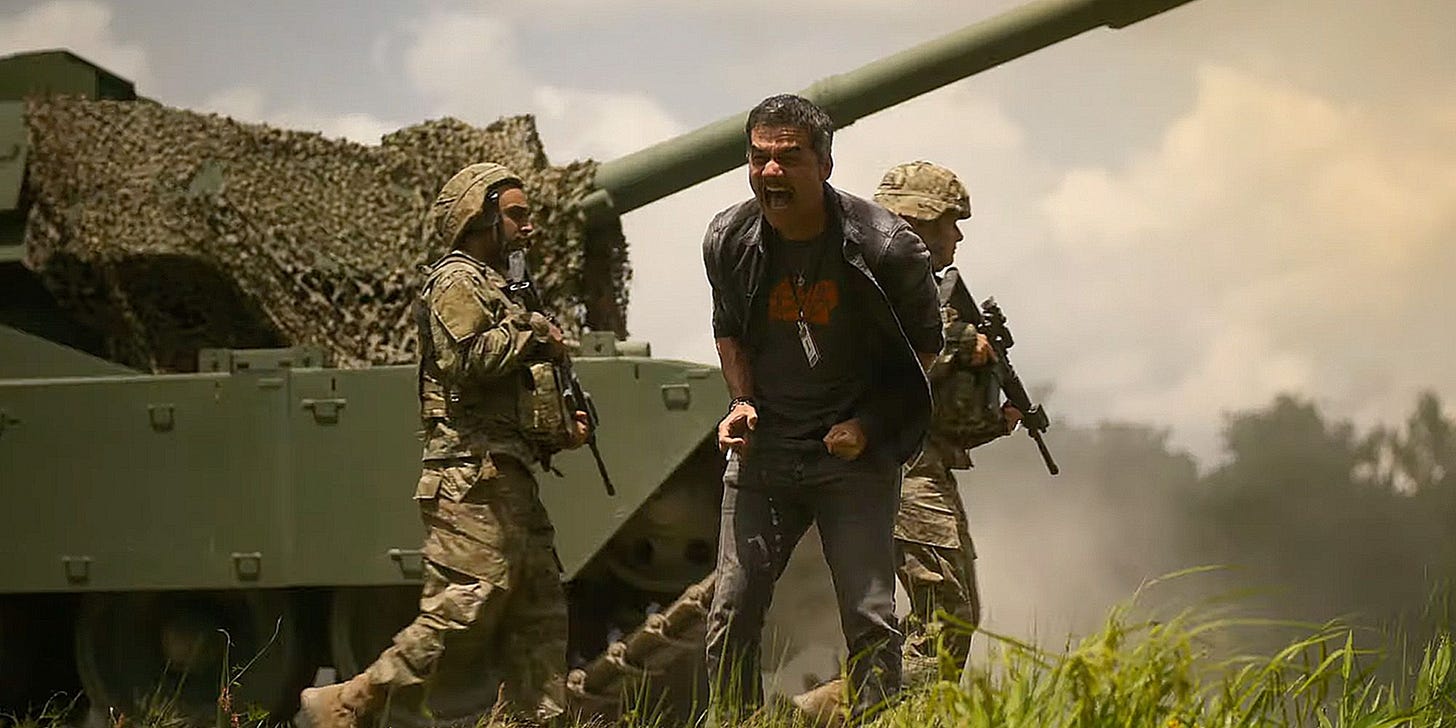Human Lens #149: 'Civil War' Review
Alex Garland's grim depiction of war on American soil subverts expectations to captivating effect.
Alex Garland is no stranger to making his audience uncomfortable. The longtime screenwriter turned director, the mastermind behind 28 Days Later, made his directorial debut in 2014 with the captivatingly sensual and horrifying Ex Machina. That film, along with Annihilation, a brief turn to television with Devs, and the divisive Men, all give a perspective of the world that toes the middle line, captivating viewers and creating a dialogue that, to arguably mixed effect, only Garland can seem to get. With his latest film, Civil War, Garland succeeds once again in crafting a narrative that will make its audience want to discuss what they just witnessed. Whether that discussion revolves around hatred or admiration for what the filmmaker is trying to say, that’s up to how much the viewer is transfixed by modern politics.
My first two reactions when the credits began to roll were, first and foremost, “I loved this,” immediately followed by my concern that people would misunderstand the purpose of the film that Garland delivered. The title, Civil War, along with its action packed trailer, have unfortunately lead the audience to believe they’re about to witness an anti-war film with violence on American soil showing how hate leads to unforgivable violence. Alex Garland has no interest in recycling those tired tropes that have been explored many times, opting instead to craft a narrative that promotes multiple discussions instead of honing in on a sole opinion. Instead of putting violence in the forefront, Garland decides to have regional and philosophical discussions about how the decisions we make steam from one of four things; personal, independent, generational, or political. He knows that he doesn't have all the answers, but consistent conversation can prevent hatred and self-indulgence from festering into the violence our nation postures itself against, whether our leaders have been successful or not.
Civil War takes the creatively intriguing approach of telling the story of this broken nation through the perspective of journalists. Lee is a famous war photographer whose storied career capturing violence has fractured her emotions and turned her into a cynic towards everything, including herself. Her goal, along with her journalist partner Joel, is to travel the war torn path to Washington D.C. in the hopes of interviewing the President before successionist forces reach the Capital.

Along this journey, we never get the full picture of why the United States became as fractured as it is, but that allows the characters to stretch out and become the backbone of the film. Each character serves as archetypes for the audience to connect with; Lee is the experienced cynic, Joel is the experienced daredevil, Sammy is the older voice of reason, and Jessie is the young optimist whose susceptible to new experiences and lessons. These four characters are the perfect mirror of the audience to wonder who they would be in a national situation such as this. The film is more interested in finding characters who can explore these themes with modesty, choosing journalists not to paint them as the heroes of wartime situations, but as the vessels of providing a way to continue the narrative for the people who need to know what’s happening in the world.
Taking the approach of telling the story in the perspective of the photojournalists of this fictional era is genius from the start. For a subject matter that could divide the audience due to personal opinions or simple uncomfortability, the photojournalists are a great vessel to not only tell a story through a position within in the media that’s as centrist in its duties in the field as possible, but it embellishes the visual medium of Garland’s film with the visual medium of the profession he’s highlighting. The overall jarring imagery may not live up to some people’s expectations, but the still shots that are showcased and captured by Cailee Spaeny’s Jessie should be enough to quell whatever those viewers may have been missing. Gore drenched, haunting imagery of violence with the backdrop of recognizable infrastructure and architecture for any U.S. citizen is imagery made to turn stomachs.

Civil War is best experienced on the biggest screen imaginable with the least amount of knowledge going into it. With the warning that this isn’t the war picture people may have assumed it was, I think audiences can be captivated by this much easier. In an age where mindless content reigns supreme over a medium that’s always been designated as an art form, Civil War is a film that actually has something to say about how we treat one another and warns of where our blind hatred could lead us if we continue to follow the hive mind agenda, and more specifically our naiveté, that surrounds us. It’s not perfect by any means, but it’s a story that will certainly be sticking with me for a long time.



